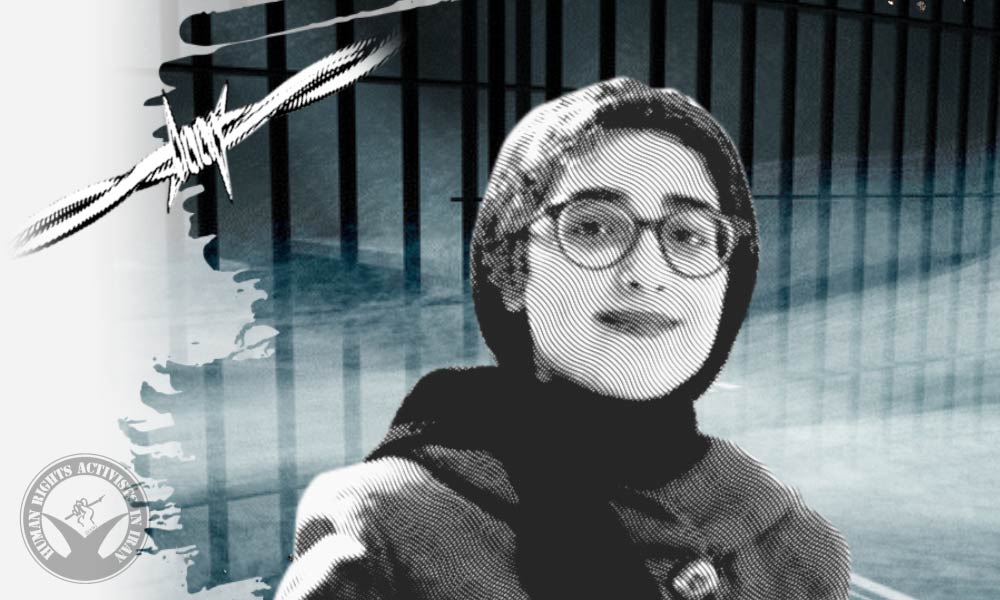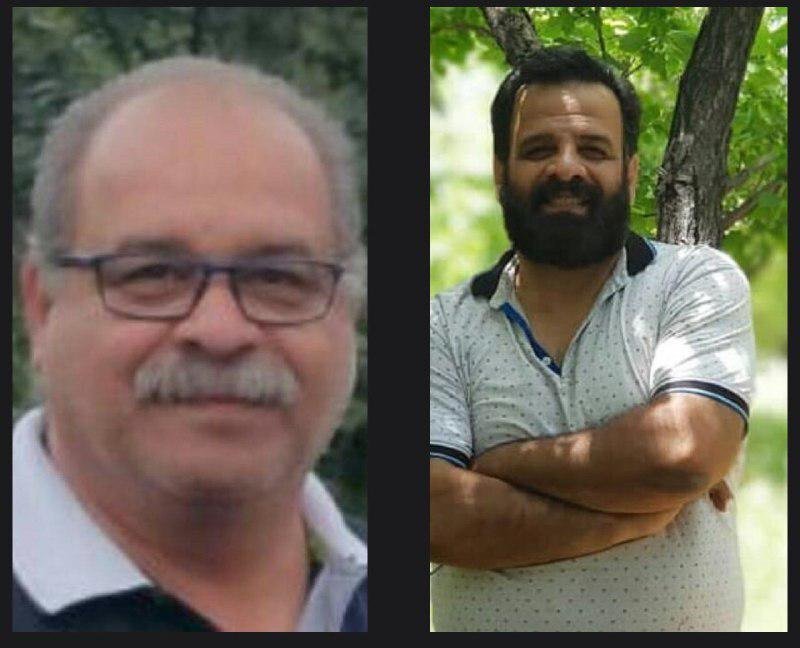Iran Press Watch, March 28, 2019. –
The last month of the Persian year 1397 (corresponding to 2018-2019 in the Gregorian calendar) was an eventful month for Baha’i prisoners. On one hand, some of them were released; on the other hand, trials, indictments, arrests and searches of their homes continued for these citizens in various cities in Iran.
On February 11th, the anniversary of the Islamic Revolution, 17 prisoners who had less than a year remaining of their sentences were pardoned and released in Shiraz, Mashhad, Ghaemshahr, Isfahan, Sanandaj and Yazd.
Pouya Tebyaaniaan (پویا تبیانیان), one of the prisoners, was released from prison in Semnan, upon the completion of his seven-year sentence. Shayda Qodousi (شیدا قدوسی), a Baha’i prisoner in Gorgan, who had been sentenced to five years in prison, after serving one-third of her sentence was released on probation in the last days of the Persian year (which ended March 20). Maryam Ghaffaarmanesh (مریم غفارمنش) and Atosa Ahmaada’i (آتسا احمدائی) were also released from Evin prison, after serving respectively 6 months and 45 days of temporary detention.
As reported by Iranwire, on March 11 security agents in Tehran arrested two Baha’i brothers, Hamid Nasseri (حمید ناصری) and Saeed Nasseri (سعید ناصری). Hamid Nasseri was arrested on the street in front of his business, and Saeed after going to the Evin detention center to inquire about the condition of his brother Hamid and of his wife Afsaneh Emami-Nasseri ((افسانه امامی(ناصری). At the time of Saeed’s arrest, 40 days had passed since the arrest of his wife, Afsaneh Emami. She was released on bail in the final days of the year, but Saeed and Hamid Nasseri still remain in detention.
The sentence against Ghazaaleh Baaqeri Taari (غزاله باقری طاری), a Baha’i from Tehran, who was tried in December 2018, was issued in February of this year. She has been sentenced to five years in prison for the crime of “activities against national security because of membership in the Baha’i administration”. She was arrested by agents of the Ministry of Intelligence in September 2017, during a religious gathering at her home, and was released on bail three weeks later.
Kaaviz Nouzdahi (کاویز نوزدهی) is another Baha’i whose sentence was announced in February. A source with knowledge of the case told Iranwire: “The court hearing for Kaaviz Nouzdahi was held in late December 2018 in Branch 4 of the Islamic Revolutionary Court in Mashhad, presided over by Judge Mansouri ( قاضی منصوری). However on the day of the hearing the judge was not present, and the hearing was conducted by the court counselor, Mr. Farhikhteh (آقای “فرهیخته). The charges against Mr. Nouzdahi were “cooperating with hostile foreign governments” and “membership in an anti-regime organization”. The judge did not permit the defendant’s attorney to be present in court or review the case file. Their excuse was that the attorney named by Mr. Nouzdahi was not on the judiciary’s list of approved attorneys, and the court hearing was conducted without the attorney present. Article 48 of the New Penal Code states that in crimes against domestic or international security as well as organized crime, in the preliminary investigation phase the parties in the case must select their attorney or attorneys from among those approved by the head of the judicial branch.
According to the verdict issued, Kaaviz Nouzdahi was acquitted of the charge of cooperation with foreign governments, and was convicted for the charge of membership in an anti-regime organization (i.e., membership in the Baha’i administration), and sentenced to four years in prison.
Another Baha’i citizen, Neda Mokhtaari (ندا مختاری), was also sentenced to four years in prison by the verdict of Branch 5 of the Revolutionary Court of Mashhad presided over by Judge Mazloumi ( قاضی مظلومی) for the crime of “teaching the Baha’i Faith”.
Twenty two Baha’i citizens began Naw-Ruz (the Persian New Year) 1398 on March 21, 2019, away from their homes and families in Iranian prisons. They were sentenced in Iranian courts to a total of 105 years of imprisonment. The verdicts against these Baha’is were issued based on articles 498, 499 and 500 of the Islamic Penal Code.
Article 498 of the code states: “Any person with any ideology who forms or leads a group, society or sub-group of more than two people, under any name or title, domestically or abroad, with the goal of disrupting national security, who is not considered a combatant, shall be sentenced to prison for two to ten years.”
According to article 499 of this law: “Any person holding a membership in one of the groups, societies or sub-groups mentioned in article 498 shall be sentenced to three months to five years in prison, unless it is proven that they were unaware of its goals.”
Article 500 also states: “Any person engaged in any way in propaganda activities against the regime of the Islamic Republic of Iran, or in favor of anti-regime groups and organizations, shall be sentenced to three months to one year in prison.”
The punishment for teaching the Baha’i Faith, membership and activity in this religious community is determined based on these articles of the law.
In Evin prison, four instructors of the Baha’i Institute of Higher Education (BIHE) are currently serving sentences for the crime of teaching youth who were deprived of a university education; Hassan Momtaaz (حسن ممتاز), Peymaan Kooshkbaghi (پیمان کوشکباغی), and Negin Qedamiaan (نگین قدمیان), each with five year prison sentences, and Azita Rafizaadeh (آزیتا رفیع زاده) with a four year prison sentence, are currently in Evin prison. Peyman Kooshkbaghi and his wife Azita Rafizadeh are among the incarcerated married couples who spent the final days of the year away from each other and from their young child.
Adel Naimi (عادل نعیمی) with an 11-year sentence, Farhaad Fahandej (فرهاد فهندژ) with a 10 year sentence, Vaahed Kholousi (واحد خلوصی) with a 5 year sentence, and Afshin Seyyed Ahmad (افشین سید احمد) with a 3 year sentence, are the four Bahai prisoners in Rajai Shahr prison in Karaj. Shahnaam Jazbaani (شهنام جذبانی) is the only Baha’i prisoner in Gonbad-e-Kavoos in Golestan province. He has been sentenced to 5 years in prison.
Isfahan, with 13 Baha’i prisoners, has the highest number of Baha’i prisoners in Iran. Nine of these prisoners were transferred to the Isfahan prison from the town of Baharestan. Of the nine, Sepideh Rouhaani (سپیده روحانی), Bahaareh Zaini (بهاره زینی), Fouzjaan Rashidi (فوژان رشیدی), each with a 3 year sentence, are incarcerated in Dowlatabad prison in Isfahan. Anousheh Raeineh (انوش راینه), Afshin Bolbolaan (افشین بلبلان), Milaad Daavardaan (میلاد داوردان), Farhang Sahba (فرهنگ صهبا) and Ali Saani (علی ثانی), each with a six year sentence, and Sahaam Armin (سهام آرمین), with a 3 year sentence, are the other six prisoners from Baharestan who have been transferred to Dastgerd prison in Isfahan to serve their sentences.
In addition, Sohraab Taqipour (سهراب نقی پور), with a 5 year sentence, and Manouchehr Rahmaani (منوچهر رحمانی), Mohsen Mehregani (محسن مهرگانی) and Farzaad Homaayouni (فرزاد همایونی), each with a 20 month sentence, are four Baha’is from Isfahan who began the Persian New Year in that city’s central prison.
Older items can be found in the archive, here. Even older news is here.

















